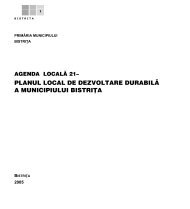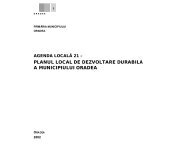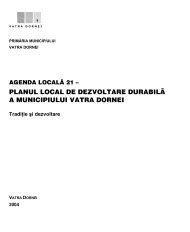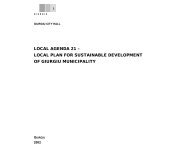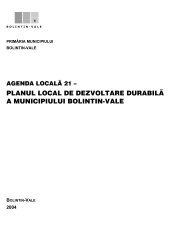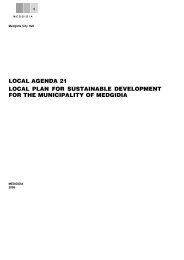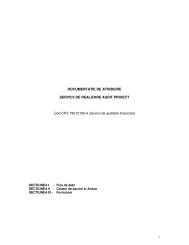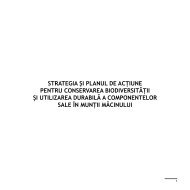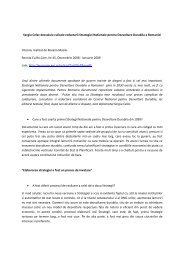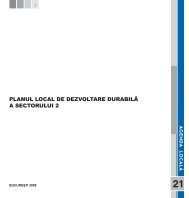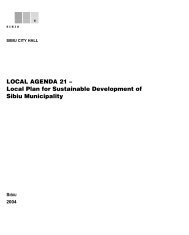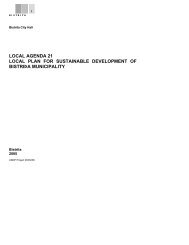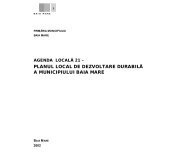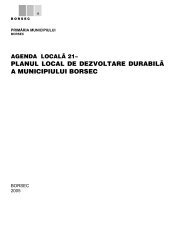English Version - United Nations Development Programme Romania
English Version - United Nations Development Programme Romania
English Version - United Nations Development Programme Romania
You also want an ePaper? Increase the reach of your titles
YUMPU automatically turns print PDFs into web optimized ePapers that Google loves.
The government must attempt to co-ordinate the development of the national communications<br />
system and the establishment of the information society, the main instrument being the co-ordinated<br />
development of the Communications Strategy and the Information Strategy in economy and society.<br />
The first tactical objectives of separating the strategic and regulatory functions on the one hand,<br />
and the operational function on the other, have already been accomplished. The liberalisation of markets<br />
and communications networks and the creation of a competitive business environment network,<br />
interconnection and interoperability of services are currently underway.<br />
Also, the management of natural resources will be institutionally separated in the future from<br />
market regulation and supervision of markets.<br />
One of the most important conditions that have to be met in order to solve the problems in this<br />
sector is to create the awareness that resources - the national assignment of telephone numbers and radio<br />
frequencies - are limited like any other natural resources, though they are less tangible.<br />
Their judicious management and their protection according to environmental protection<br />
principles are essential elements of normative, institutional, technological and commercial reform, with<br />
the additional efforts of the national operators that are currently formulating their sector policies.<br />
Harmonisation of internal regulations, norms, and technologies with those in Europe, as well as<br />
regional co-operation in the field of communications, are very important political decisions.<br />
<strong>Romania</strong>'s active participation in the main international bodies involved in decision making<br />
regarding the development of communications, the most dynamic sector of the global economy, must not<br />
be neglected. The gradual harmonisation of internal and international regulations is a major contributing<br />
factor to <strong>Romania</strong>'s integration in the European Union, as is the interconnection of the National<br />
Communications System to the regional and international communications systems.<br />
Technological advancement and level of usage of the latest value-added services are good<br />
indicators for a country's level of economic development. Therefore, the strategy for sustainable<br />
development must also have in view means of encouraging the increase in the number of users and in the<br />
flow of voice, data and image transmissions via the national system of telecommunications using<br />
incentives, including flexible tariff and customs policies.<br />
5.6 Information Technology<br />
This strategy sets global objectives on short term (until the year 2000) and a medium and long<br />
term (until the year 2005).<br />
The short-term objectives of this strategy are:<br />
Creating a national communications infrastructure capable to offer support for the introduction and<br />
intensive use of data processing capabilities at the local and central level of the public administration<br />
(up to the municipal level);<br />
Developing the national industry for products and services specific to the information and<br />
communications technologies, software industry, especially the software industry;<br />
Creating a context that will encourage the use of information and communication technologies on a<br />
large scale in all economic and social fields and the harmonisation with E.U. regulations in this field;<br />
The medium- and long-term objectives of the strategy are:<br />
Extending the communications infrastructure (up to the level of communes);<br />
<strong>Romania</strong>n society should reach a level of data processing technology that will allow its integration<br />
into the European information society.<br />
Strategies for a short and medium term must be sustainable, but also dynamic, taking into account<br />
the unparalleled technological development in this field. As a result, the above-mentioned objectives must<br />
be achieved by:<br />
Extending an modernising the national infrastructure:<br />
Creating an information core, consisting of lists and classifications of general interest, permanent<br />
registers (population, territorial-administrative units, road infrastructure, socio-economic agents,<br />
general surveys, etc.), public databases (legislation, synthetic indicators, patrimony objects, licences<br />
and copyrights, etc.);<br />
Creating a data communications infrastructure for the public administration sector, including the<br />
justice system<br />
Ensuring the existence of a legal framework for the development and use of information technology,<br />
that should be compatible with that currently used in European countries: freedom of information,<br />
data protection and security, personal data protection, status of electronic documents, intellectual<br />
property in the field of databases, regulation authority and data processing control, responsibilities<br />
and sanctions for computer crimes.<br />
52



